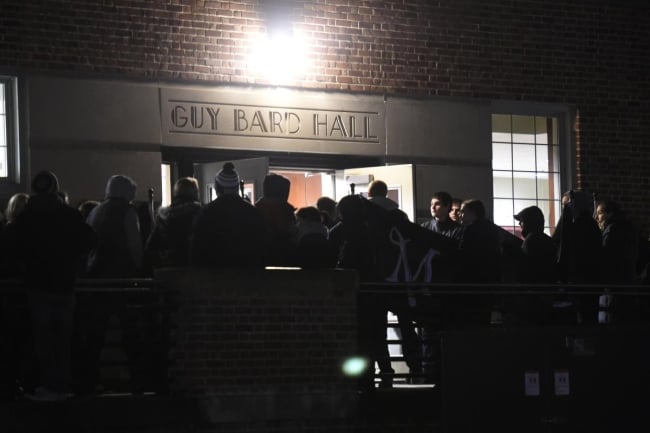You have /5 articles left.
Sign up for a free account or log in.

Mourners gather in memory of Karlie Hall on the Millersville University campus in February 2015 after Hall was murdered by her boyfriend in her dorm room. A new appeals court ruling revives a Title IX lawsuit filed by Hall's family.
Jeremy Drey/MediaNews Group/Reading Eagle via Getty Images
Millersville University in Pennsylvania was given prior notice that it could be held liable under Title IX “for its deliberate indifference to known sexual harassment perpetrated by a non-student guest,” a federal appeals court ruled last week.
The ruling revives a lawsuit filed by the parents of Karlie Hall, a student murdered in her dorm room in 2015 by her boyfriend, who did not attend the university.
In ruling in the Halls’ favor, a three-judge panel from the U.S. Court of Appeals for the Third Circuit reversed the holding of the district court, which had ruled the university lacked notice that it could have been held liable under Title IX, the statute that prohibits sex-based discrimination in federally funded educational institutions, for violence perpetrated by a nonstudent guest.
“Title IX’s plain terms notify federal funding recipients that they may face monetary liability for intentional violations of the statute,” the Third Circuit ruling states. “Moreover, it is an intentional violation of Title IX’s terms for a funding recipient to act with deliberate indifference to known sexual harassment where the recipient exercises substantial control over the context in which the harassment occurs and the harasser, even if they are a third party.”
Jim Davy, an attorney who represented the Hall family, said the ruling “confirms important protections for students in states that are in the Third Circuit and beyond, where if you’re going to a school and the school has knowledge that you’re facing harassment or dating violence or other sex-based violence and they have the ability to do something about that, they have to do something about it.
“They can’t just excuse any responsibility by saying the harassment is happening by a third party,” Davy said. “When you consider the many third-party interactions that happen on K-12 schools and college campuses, this is a really important decision that will protect student rights going forward.”
Janet Kacskos, a spokeswoman for Millersville, said the university is “thoroughly reviewing the Third Circuit’s opinion and consulting with our attorneys on this matter.”
She said the university “continues to mourn the loss of Ms. Hall, and our deepest sympathies remain with her family and loved ones.”
The lawsuit centers largely on Millersville’s failure to act—at least according to the facts as presented in the Third Circuit ruling—in response to an October 2014 domestic violence incident in Hall’s dorm room during which Hall was injured by her boyfriend, Gregorio Orrostieta.
Although a university police officer responded, the officer did not initially file a report; an incident report was only filed subsequent to Hall’s murder by Orrostieta several months later.
Furthermore, a report on the incident submitted to the Title IX office by Hall’s resident adviser allegedly was filed away by Millersville’s deputy Title IX coordinator, in violation of the university’s policies.
Although Millersville’s Title IX policy required victims of domestic or dating violence to be contacted, Hall was never contacted by anyone at Millersville following submission of the resident adviser’s report, according to the ruling. The ruling also notes that Millersville had other policies outside Title IX to control the comings and goings of a guest, including policies requiring guests to sign in and the ability to issue a no-trespass order.
Hall was killed in her room in Bard Hall, a dorm on campus, on the night of Feb. 7, 2015. According to the ruling, Orrostieta killed Hall through “strangulation and multiple traumatic injuries” and potentially sexually assaulted her. Orrostieta was convicted of third-degree murder in Hall’s death and sentenced to 20 to 40 years in prison.
In finding that the district court erred in concluding the university could not be held liable under Title IX for the actions of a nonstudent, the Third Circuit court cited a 1999 Supreme Court case, Davis v. Monroe County Board of Education.
“The Supreme Court made clear in Davis that a funding recipient may be liable for acts of sexual harassment by individuals other than students,” the Third Circuit found. “Though Davis concerned only deliberate indifference to known student-on-student harassment, the Court’s holding was not based upon the classification of the harasser as a student, guest, or other type of third party … Instead, the Court’s focus was on whether the funding recipient had control over the harasser and the context of the harassment since the funding recipient can only ‘subject’ students to discrimination under Title IX if it has control over the harasser and remains deliberately indifferent to the harasser’s actions.”
The appeals court found that Millersville’s own Title IX policies in place at the time Hall was enrolled “contemplated Title IX liability could result from the actions of third parties such as ‘visitors’ like Orrostieta.”
The appeals court also cited guidance from the Department of Education’s Office for Civil Rights stating that harassment by third parties is covered by Title IX, and the appeals court disagreed with the interpretation of the district court, which had interpreted the OCR guidance to mean that colleges only were on notice they faced liability for harassment by third parties when the harasser was invited by the university, such as in the case of an invited professor or athlete.
The appeals court further addressed Millersville’s argument that ruling in favor of the Halls “will open the floodgates and subject universities to unwarranted liability under Title IX for ‘anyone’s on-campus conduct resulting in the disruption or outright destruction of a student’s pursuit of her education,’” as the college put it in its brief.
“While we recognize that this is a valid policy concern, the Supreme Court’s holding in Davis forecloses Millersville’s worry,” the Third Circuit ruled. “To be liable under Title IX, the university would have to have ‘substantial control over both the harasser and the context in which the known harassment occurs’ … Moreover, the university would have to know of the harassment and ultimately respond in a manner that is ‘clearly unreasonable’ … We do not think it is likely that a university would have substantial control over any random third party who wanders onto an open campus and harasses students, nor it is likely that a university would have substantial control over all aspects of a campus which is open to the public … Even if the university had such control, however, if the university is not made aware of the third-party harassment or responds in a manner that is not clearly unreasonable, it will not face liability. Put simply, there is a high bar to establish liability for deliberate indifference under Title IX, and our holding today does little to lower that bar.”
Alexandra Brodsky, a staff attorney at Public Justice, a nonprofit legal advocacy group that joined with the Women’s Law Project in filing an amicus brief in support of the Halls, called the ruling a “clear recognition that schools have an obligation to respond to known sexual harassment that happens within their control regardless of the identity of the harasser. There are no categorical exemptions from Title IX’s protections if the harasser is the student’s own guest.”
“I don’t want to overstate it, in that I don’t want to say this is some kind of expansion of the law, because I think that has been the state of the law for a long time,” Brodsky said. “But it’s still always helpful to have a court explain the contours of the law in such a clear way.”
Jake Sapp, chief compliance officer and deputy Title IX coordinator at Austin College in Texas, and an attorney who studies Title IX, said he believes the ruling may potentially expand universities’ liability.
“The court specifically cites that there’s an argument this will open the floodgates, allowing liability for any random third party that comes on campus,” Sapp said. “The court says, ‘No, they have to fit within the framework of Title IX,’ but then they find that the school had control because they had the option to issue a no-trespass order—but the school also has an ability to issue a no-trespass order against anyone who comes on campus. I think it does potentially expand liability for institutions strictly based on the fact that the line of exercising substantial control is grayed a little bit from this case.”
“It’s not necessarily the floodgates opening,” Sapp added, “but it does beg the question of what is the dispositive factor for control.”




